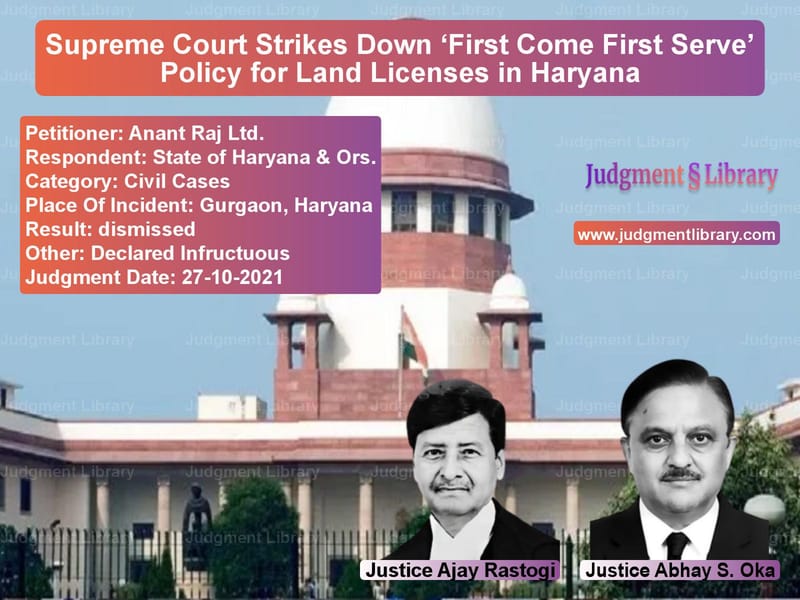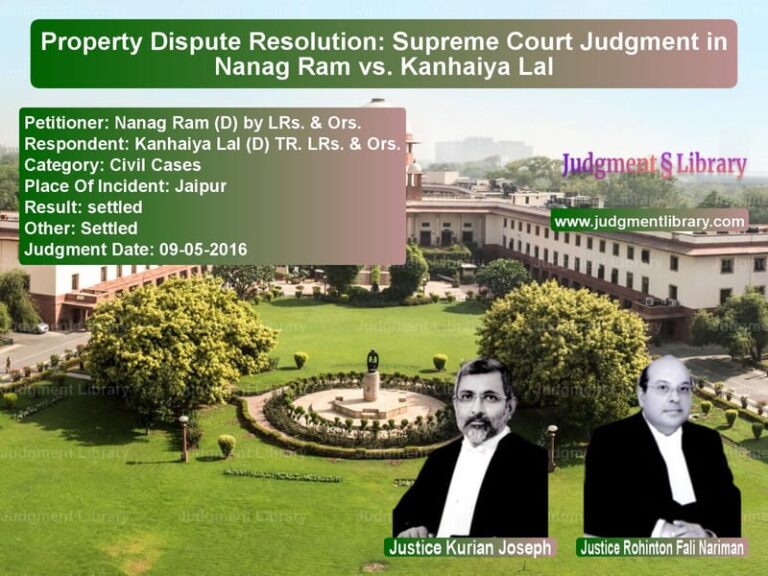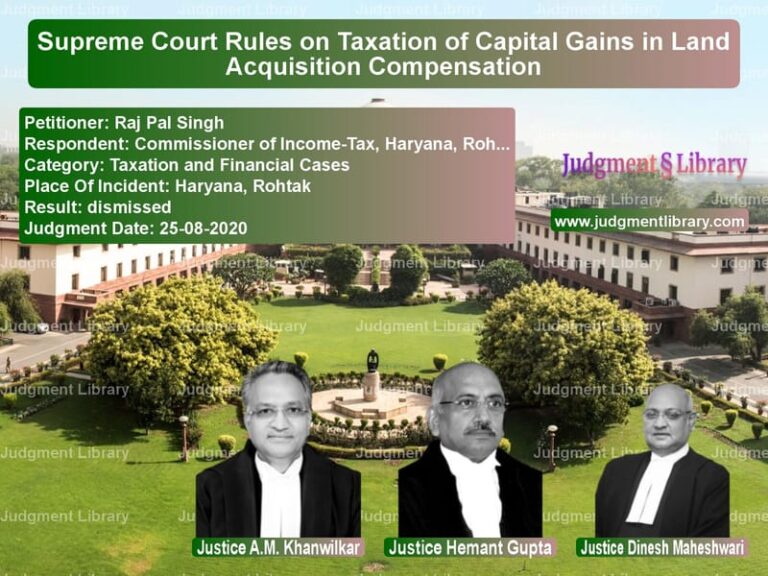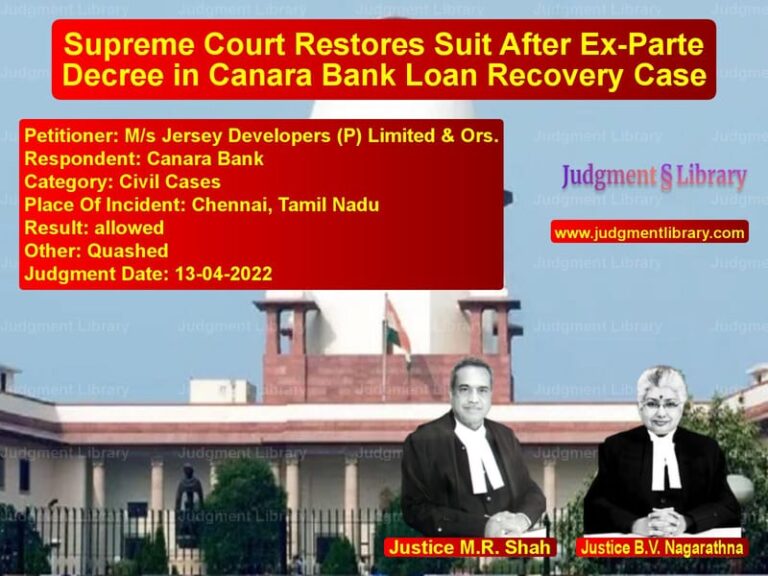Supreme Court Strikes Down ‘First Come First Serve’ Policy for Land Licenses in Haryana
The Supreme Court of India, in a landmark ruling in the case of Anant Raj Ltd. v. State of Haryana & Ors., struck down the Haryana government’s long-standing ‘First Come First Serve’ (FCFS) policy for granting land development licenses. The Court held that the policy was arbitrary, unfair, and violated Article 14 of the Constitution, which guarantees equality before the law. The ruling is expected to have far-reaching consequences on land allotment and urban planning policies in India.
Background of the Case
The case arose from disputes regarding the grant of licenses for group housing colonies under the Final Development Plan of Gurgaon-Manesar Urban Complex for 2025. The appellants, Anant Raj Ltd. and others, were developers who had obtained licenses under the FCFS policy, while the respondents were applicants who had been denied licenses under the same policy.
The dispute centered around the Haryana Development and Regulation of Urban Areas Act, 1975 (‘1975 Act’) and the Haryana Development and Regulation of Urban Areas Rules, 1976 (‘1976 Rules’). The High Court of Punjab and Haryana had previously ruled against the FCFS policy, directing the state government to frame a more transparent and equitable system for granting land development licenses. Aggrieved by this ruling, the developers filed an appeal before the Supreme Court.
Legal Issues Examined
- Whether the ‘First Come First Serve’ policy was legally valid and fair.
- Whether the rejection of the respondents’ applications for licenses was arbitrary.
- Whether the state government had violated principles of fairness, transparency, and equal opportunity in granting licenses.
- Whether the developers’ licenses, granted under the FCFS policy, should be revoked.
Petitioner’s (Anant Raj Ltd. & Ors.) Arguments
The appellants argued:
- The FCFS policy had been followed for years without any challenge.
- Their applications had met all legal requirements and were processed fairly.
- The High Court’s ruling unfairly targeted them while other developers had also obtained licenses under the same policy.
- They had invested substantial amounts based on legitimate expectations that the policy was valid.
Respondent’s (State of Haryana & Others) Arguments
The respondents contended:
- The FCFS policy was not mentioned in the 1975 Act or 1976 Rules and had been implemented in an arbitrary and non-transparent manner.
- Applicants with political or bureaucratic connections were often given preferential treatment.
- The policy led to an unregulated race among applicants, creating unfair advantages.
- Public land must be allocated based on a transparent and merit-based system, not on who submits an application first.
Supreme Court’s Observations
On the Validity of the ‘First Come First Serve’ Policy
The Court ruled that the FCFS method for granting licenses was arbitrary, non-transparent, and in violation of Article 14:
“The principle of First Come First Serve basis for allotment of licenses is neither rational nor in public interest and is in violation of Article 14 of the Constitution.”
On the Need for a Transparent System
The Court emphasized the importance of transparency and equal opportunity in public resource allocation:
“A non-discriminatory method is imperative when the State is dealing with public resources. Fairness and transparency must be at the core of such policies.”
On the Developers’ Claim to Valid Licenses
The Court held that since the licensing policy itself was flawed, the developers’ licenses could not be considered valid:
“Since the principle of First Come First Serve is held to be unfair, the consequence must be the cancellation of licenses granted under this policy.”
On the Government’s Failure to Ensure Fair Competition
The judgment also pointed out that the FCFS policy favored those with inside knowledge:
“Those with access to power corridors were able to submit applications early, while the general public remained unaware. This policy was never codified or publicized fairly.”
Final Judgment
The Supreme Court ruled:
- The ‘First Come First Serve’ policy for land licenses was unconstitutional and must be replaced with a fair and transparent system.
- The licenses granted under the policy were revoked.
- The State of Haryana was directed to formulate a new, transparent policy.
- Pending applications were to be reconsidered under the new policy.
Significance of the Judgment
- Establishes Fairness in Land Allocation: Reinforces that public resources must be distributed based on objective and transparent criteria.
- Protects Against Favoritism: Prevents arbitrary allocation of land licenses to well-connected individuals.
- Sets a Precedent for Other Land Policies: Encourages states to adopt fairer and more merit-based allocation systems.
- Ensures Judicial Oversight: Reinforces that courts can intervene when state policies violate fundamental rights.
Conclusion
The Supreme Court’s decision in Anant Raj Ltd. v. State of Haryana is a landmark judgment reinforcing fairness and transparency in land allocation. By striking down the ‘First Come First Serve’ policy, the Court has ensured that public resources are not distributed arbitrarily but through an equitable and merit-based system. This ruling will likely influence future urban planning and development policies across India.
Petitioner Name: Anant Raj Ltd..Respondent Name: State of Haryana & Ors..Judgment By: Justice Ajay Rastogi, Justice Abhay S. Oka.Place Of Incident: Gurgaon, Haryana.Judgment Date: 27-10-2021.
Don’t miss out on the full details! Download the complete judgment in PDF format below and gain valuable insights instantly!
Download Judgment: anant-raj-ltd.-vs-state-of-haryana-&-o-supreme-court-of-india-judgment-dated-27-10-2021.pdf
Directly Download Judgment: Directly download this Judgment
See all petitions in Property Disputes
See all petitions in Landlord-Tenant Disputes
See all petitions in Specific Performance
See all petitions in Judgment by Ajay Rastogi
See all petitions in Judgment by Abhay S. Oka
See all petitions in dismissed
See all petitions in Declared Infructuous
See all petitions in supreme court of India judgments October 2021
See all petitions in 2021 judgments
See all posts in Civil Cases Category
See all allowed petitions in Civil Cases Category
See all Dismissed petitions in Civil Cases Category
See all partially allowed petitions in Civil Cases Category







